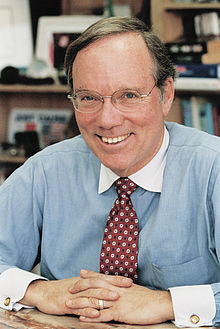John Harold Williamson was a British-born economist who coined the term Washington Consensus. He served as a senior fellow at the Peterson Institute for International Economics from 1981 until his retirement in 2012. During that time, he was the project director for the United Nations High-Level Panel on Financing for Development in 2001. He was also on leave as chief economist for South Asia at the World Bank during 1996–99, adviser to the International Monetary Fund from 1972 to 1974, and an economic consultant to the UK Treasury from 1968 to 1970. He was also an economics professor at Pontifícia Universidade Católica do Rio de Janeiro (1978–81), University of Warwick (1970–77), Massachusetts Institute of Technology, University of York (1963–68) and Princeton University (1962–63).

Jagdish Natwarlal Bhagwati is an Indian-born naturalized American economist and one of the most influential trade theorists of his generation. He is a University Professor of economics and law at Columbia University and a Senior Fellow in International Economics at the Council on Foreign Relations. He has made significant contributions to international trade theory and economic development.

Robert Bruce Zoellick is an American public official and lawyer who was the 11th president of the World Bank Group, a position he held from July 1, 2007, to June 30, 2012. He was previously a managing director of Goldman Sachs, United States Deputy Secretary of State and U.S. Trade Representative, from February 7, 2001, until February 22, 2005. Zoellick has been a senior fellow at Harvard's Belfer Center for Science and International Affairs since ending his term with the World Bank. He is currently a Senior Counselor at Brunswick Group.

Pascal Lamy is a French political consultant and businessman. He was the Director-General of the World Trade Organization (WTO) from 1 September 2005 to 1 September 2013 for 8 years. In April 2009, WTO members reappointed Lamy for a second 4-year term, beginning on 1 September 2009. He was then succeeded by Roberto Azevêdo. Pascal Lamy was also European Commissioner for Trade for 5 years, from 13 September 1999 to 22 November 2004 and is an advisor for the transatlantic think-tank European Horizons, as well as currently serving as the Honorary President of the Paris-based think tank, Notre Europe.
Peter Bain Kenen was an American economist, who was the Walker Professor of Economics and International Finance at Princeton University, and senior fellow in international economics at the Council on Foreign Relations.
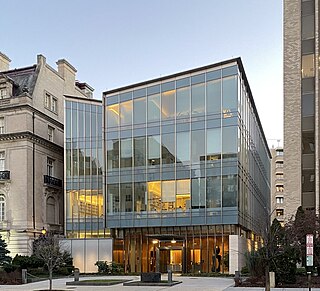
The Peterson Institute for International Economics (PIIE), known until 2006 as the Institute for International Economics (IIE), is an American think tank based in Washington, D.C. It was founded by C. Fred Bergsten in 1981 and has been led by Adam S. Posen since 2013. PIIE conducts research, provides policy recommendations, and publishes books and articles on a wide range of topics related to the US economy and international economics.

The School of International and Public Affairs (SIPA) is the international affairs and public policy school of Columbia University, a private Ivy League university located in Morningside Heights, Manhattan, New York City. It is consistently ranked one of the leading graduate schools for international relations in the world. SIPA offers Master of International Affairs (MIA) and Master of Public Administration (MPA) degrees in a range of fields, as well as the Executive MPA and Ph.D. program in Sustainable Development.
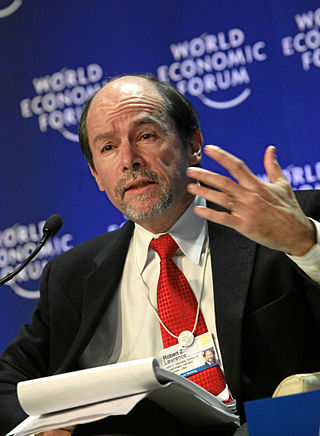
Robert Zachary Lawrence is a South Africa-born American economist and Albert L. Williams Professor of International Trade and Investment at John F. Kennedy School of Government at Harvard University. He is also a senior fellow at the Peterson Institute for International Economics, and a research associate at the National Bureau of Economic Research.
Bates Gill is an American analyst specialized in Chinese foreign policy and politics, currently serving as executive director of Asia Society's Center for China Analysis. He formerly was Director of the Stockholm International Peace Research Institute (SIPRI).
Brad W. Setser is an American economist. He is a former staff economist at the United States Department of the Treasury, worked at Roubini Global Economics Monitor as Director of Global Research where he co-authored the book "Bailouts or Bail-ins?" with Nouriel Roubini, as a fellow for international economics at the Council on Foreign Relations, for the United States National Economic Council as Director of International Economics, for the United States Department of the Treasury, and as Deputy Assistant Secretary for International Economic Analysis as senior fellow for international economics at the Council on Foreign Relations.
Edwin (Ted) M. Truman is an American economist specializing in international financial institutions, especially the International Monetary Fund and sovereign wealth funds. He has been a Senior Fellow with the Peterson Institute for International Economics since 2001. Truman has worked quietly over the years on international financial crises issues. Nobel laureate Paul Krugman described Truman as the "George Smiley of international economics".
The Group of Two is a hypothetical and an informal grouping made up of the United States of America and People's Republic of China that was first proposed by C. Fred Bergsten. While the original concept had a strong economic focus, more recent iterations have a more all-encompassing focus. This is the result of the concept gaining more traction with members of the Obama Administration and foreign policy establishment who came to recognize the increasing importance of America's relationship with China. Prominent advocates of the grouping include former National Security Advisor Zbigniew Brzezinski, historian Niall Ferguson, former World Bank President Robert Zoellick and former chief economist Justin Yifu Lin.
Richard T. McCormack is an American government official and diplomat. He has served nearly five decades advising policymakers on foreign affairs and global economic developments. He is currently a senior advisor for CSIS in Washington, D.C.
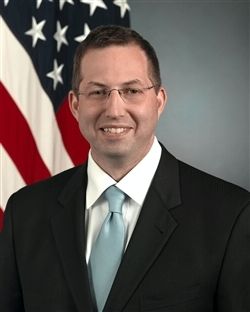
Derek James Mitchell is an American diplomat with extensive experience in Asia policy. He was appointed by President Barack Obama as the first special representative and policy coordinator for Burma with rank of ambassador, and was sworn in by Secretary of State Hillary Clinton on October 2, 2011. On June 29, 2012, the U.S. Senate confirmed him as the new United States Ambassador to Burma. On September 4, 2018, Mitchell succeeded Kenneth Wollack as president of the National Democratic Institute, a position he served until September 2023.
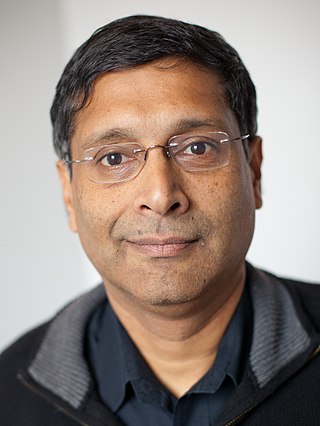
Arvind Subramanian is an Indian economist and the former Chief Economic Advisor to the Government of India, having served from 16 October 2014 to 20 June 2018. Subramanian is currently a Senior Fellow at the Watson Institute for International and Public Affairs at Brown University. He previously served as Professor of Economics at Ashoka University and a Senior Fellow at the Peterson Institute for International Economics and Center for Global Development.

Phillip Lee "Phill" Swagel is an American economist who is currently the director of the Congressional Budget Office. As Assistant Secretary of the Treasury for Economic Policy from 2006 to 2009, he played an important role in the Troubled Asset Relief Program that was part of the U.S. government's response to the financial crisis of 2007–08. He was recently a Professor in International Economics at the University of Maryland School of Public Policy, a non-resident scholar at the American Enterprise Institute, senior fellow at the Milken Institute, and co-chair of the Bipartisan Policy Center's Financial Regulatory Reform Initiative.

Karen Dynan is an American economist who is Professor of the Practice of Economics at Harvard University and a Non-resident Senior Fellow at the Peterson Institute for International Economics. She previously served as the Assistant Secretary of the Treasury for Economic Policy and Chief Economist of the United States Department of the Treasury, having been nominated to that position by President Barack Obama in August 2013 and confirmed by the U.S. Senate in June 2014. From 2009 to 2013, Dr. Dynan was the Vice President and Co-director of the Economic Studies program at the Brookings Institution. Prior to joining Brookings, she served on the staff of the Federal Reserve Board for 17 years. Dr. Dynan is an expert on macroeconomic policy, consumer behavior, household finance, and housing policy.

The Foreign Affairs Policy Board is an advisory board that provides independent advice and opinion to the Secretary of State, the Deputy Secretary of State, and the Director of Policy Planning on matters concerning U.S. foreign policy. The Board reviews and assesses global threats and opportunities, trends that implicate core national security interests, tools and capacities of the civilian foreign affairs agencies, and priorities and strategic frameworks for U.S. foreign policy. The Board meets in a plenary session several times a year at the U.S. Department of State in the Harry S. Truman Building.
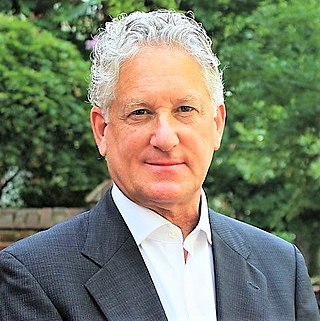
Harry Gerard Broadman is an international investment executive and global business strategist; an authority on trade, antitrust, corporate governance, sustainability, and innovation; and a non-executive corporate director. He is a Partner, managing director, and Chair of the Emerging Markets Practice and Chair of the Committee on Foreign Investment in the United States (CFIUS) Practice at the Berkeley Research Group LLC and on the faculty of Johns Hopkins University.
